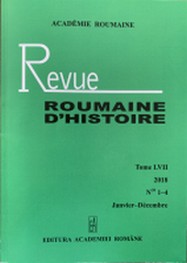Revolution, Uprising or Coup d’état? A Critical Review of the Romanian Historiographical Tradition of the Movement led by Tudor Vladimirescu
Revolution, Uprising or Coup d’état? A Critical Review of the Romanian Historiographical Tradition of the Movement led by Tudor Vladimirescu
Author(s): Cristian PloscaruSubject(s): History, Political history, 19th Century
Published by: Editura Academiei Române
Keywords: revolution; movement; historiographical tradition; historical epochal threshold;
Summary/Abstract: From a historical point of view, the events of 1821 have not only a political significance, insofar as they are associated with the idea of revolution, but also a symbolic one, as a result of the “epochal threshold” that they imposed and the entire historical mythology built around them. Until recent decades, scholars have credited two traditions in interpreting revolution: the Marxist and the Weberian traditions. The structuralist view, dialectics, and historical materialism exercised an overwhelming influence on post-war Romanian historiography, including on the meaning of the concept of revolution, until around the 2000s. Our research aims to review the Romanian historiography dedicated to the events of 1821 in the Romanian Principalities and the manner they can be associated with these contradictory theories on the concept of revolution. Our approach also takes into account Theda Skocpol’s definition of “social revolution,” S. N. Eisenstadt’s research on the phenomenon of “charismaticization” and Hans Blumenberg’s concept of “epochal threshold.” At the same time, we think it is important to refer to a recent article by Radu G. Păun, who reopens the discussion on Vladimirescu’s personality and intentions. Was he an exponent of the Romanian Old Regime or did he, in fact, go beyond his era, launching new ideas and political practices, coherent enough to propose a new type of political legitimacy, originating from a political community endowed with a historical personality (the nation) and not (or, at least, not only, as we find in other European states of the time) from God? In our opinion, the answer to these fundamental questions will allow a critical approach to the vast Romanian historiography dedicated to this subject, as well as a new history of the moment of 1821, a history detached from the endless dispute about the affiliation (or not) of Tudor of Vladimiri to Eteria.
Journal: Revue Roumaine d’Histoire / Romanian Journal of History
- Issue Year: LX/2021
- Issue No: 1-4
- Page Range: 3-24
- Page Count: 22
- Language: English

